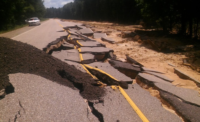Louisiana, recently awarded more than $400 million in federal aid to recover from August and March floods, says its need is much larger and has increased an earlier request for federal repair and recovery funding.
Gov. John Bel Edwards (D), in an Oct. 20 letter to President Obama, welcomed $438 million in Housing and Urban Development disaster-relief block grants it was awarded a week earlier, but, citing updated estimates, requested an additional $4 billion.
Edwards said that includes $3.3 billion in HUD block grants beyond those awarded in October. He said that Louisiana’s current estimate of unmet needs for owner-occupied housing is $2.8 billion, noting that in some localities, 80% of the homes suffered flood damage.
He also requested $39 million in Federal Highway Administration emergency-relief funds for road and bridge repairs.
Edwards on Sept. 12 had asked Obama for a total of $2.8 billion in HUD grants.
It would be up to Congress to provide additional funds for Louisiana. The next opportunity would come in the post-election lame duck session. An expected wide-ranging appropriations package could be a vehicle for further emergency aid for Louisiana, and for North Carolina and other southeast states hammered in October by Hurricane Matthew.
Congress must act on appropriations by Dec. 9, when a current stopgap continuing resolution expires.
Louisiana did receive $437.8 million of the $500 million in block grants that HUD awarded on Oct. 13. Texas got $45.2 million and West Virginia’s allocation was $17 million.
The $500 million was part of the stopgap spending bill enacted on Sept. 29. In that measure, lawmakers directed that the $500 million should go to “the most impacted and distressed areas” hit by natural disasters from Jan. 1 to Sept. 29, 2016.
HUD said it used Federal Emergency Management Agency data outlining the greatest amount of “unmet housing need.” It determined that those areas included six counties in Louisiana, three in Texas and two in West Virginia.
HUD Secretary Julián Castro said in a statement that Louisiana, Texas and West Virginia “experienced intense and destructive flooding causing great damage to residents’ homes and draining state resources.”
HUD will issue a Federal Register notice soon spelling out the criteria for using the grants. It said the aid can go for a wide range of purposes, including redeveloping housing, aiding businesses and repairing infrastructure.
Meanwhile, federal post-Matthew funds continue to move to states in the southeast. South Carolina on Oct. 20 received $1 million in Federal Highway Administration emergency-relief funds to help it start the most critical repairs to roads, highways and bridges damaged by Matthew.
FHWA said that there is widespread transportation damage in 13 South Carolina counties.
FHWA’s aid to South Carolina is the first installment of federal post-hurricane funds to the state, said FHWA Administrator Gregory Nadeau.
The South Carolina Dept. of Transportation reported via Twitter on Oct. 23 that the number of state highway and bridge closures had dropped sharply, to 61 as of that date, down from a peak of 481 on Oct. 10.
SCDOT Secretary Christy Hall said on Oct. 21 that more than 1,600 maintenance workers have been clearing debris from roads and monitoring river levels that might affect bridges.
FHWA on Oct. 12 sent North Carolina $5 million in post-Matthew emergency repair aid.
Story updated on Oct. 24 with 10/23 figures on South Carolina road and bridge closures.




Post a comment to this article
Report Abusive Comment